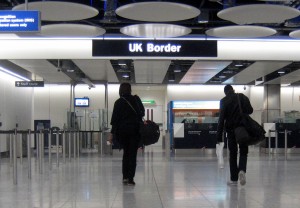Helene Cardona is a recent M.Sc. Human Rights student at L.S.E., specializing in gender and international migration. She will begin working with the International Committee of the Red Cross in Geneva next month.
Click here for all blog posts in this series

The threat of enslavement for asylum seekers does not decrease upon arrival in the United Kingdom. The rules for claiming asylum, often unknown to seekers, emphasize the importance of hastiness. As the government guide explicitly states: “your application is more likely to be denied if you wait.” A late claim carries the unintended consequence of arousing doubt and suspicion, putting asylum seekers in a vulnerable position. This “suspicion” can result in the rejection of asylum claims, which diminishes security on the one hand, by removing police protection, while magnifying the vulnerability and susceptibility of asylum seekers to be victimized by those with sinister intentions. Unfortunately, this tragic cycle is a common occurrence in the proliferation of modern slavery in the U.K.
Slavery is prevalent in the U.K. Mainstream rhetoric, however, often casts the issue as exclusively foreign and industrial, cloaking the high number of instances of domestic slavery. The media coverage of Rohingya refugees off the coast of Thailand this summer points to this tendency. The horrific accounts of migrants, from Burma and Bangladesh, held in camps before being sold to fishermen in Thailand sparked global outrage. While mainstream news coverage of the “jungle prisons” in Malaysia aired non-stop, social media was also inundated with seemingly endless photos of refugees on fishing boats. The coverage of this story serves as a stark contrast to the abhorrent absence in the conversation of modern slavery occurring within U.K. borders. Here, stories of enslavement are underground; the numbers of victims who are known to the authorities belies the actual number of people enslaved in the U.K., mostly for sexual exploitation and domestic labor. What is certain, however, is that the number of trafficking victims is rising to no apparent end. From 2012 to 2013 alone the number of reported instances of enslavement grew twenty percent.
This cloaking of truth forms the motivation of my focus on the situation faced by asylum seekers in the U.K., and especially how British immigration policy can make them more susceptible to trafficking and enslavement. People are trafficked when they are deceived or transported forcefully to be “bought, sold, and exploited.” News reports of the Mediterranean refugee crisis have revealed that many asylum seekers use the service of smugglers to reach Europe, making them more vulnerable to human traffickers.
At the same time, the British government continues to tighten its immigration control, especially with regard to refugees (recall its response to the Calais crisis). These policy changes detrimentally impact asylum seekers. The Home Office, the government agency responsible for processing immigration and asylum claims, is marked by a culture of disbelief, resulting in a monumental burden of proof placed on claimants. Put bluntly, the U.K. appears to use as little effort as possible to fulfill its obligations under international law to welcome asylum seekers and evaluate their claims in a fair way. The increasingly strict immigration system has resulted in asylum seekers relying on illicit channels more than in the past to make the journey to the U.K. It has therefore magnified their susceptibility to trafficking and enslavement. The rights of asylum seekers to obtain the state protection is echoed throughout various international human rights mandates. Yet the U.K. immigration system pushes vulnerable people into the arms of traffickers by forcing them to undertake illegal and dangerous journeys in order to claim asylum.

In addition to magnifying the vulnerability of asylum seekers to trafficking before making a claim, the immigration system is problematic for another reason. It actively undermines the protection of asylum by disenfranchising those who have managed to make a claim here. At the beginning of August, the Home Office made the decision to end benefits for asylum seeking families with children whose claims have been rejected. Support for this policy is based on the grounds that the U.K. is not a land of “handouts” – charged rhetoric with recognizable connotations. However, there are two salient objections to the new benefits requirement. Firstly, the aforementioned culture of disbelief at the Home Office leads to wrongful denials of asylum. An astounding 30% of claims rejected by the Home Office are subsequently granted during appeals. Secondly, these families receive (and are denied) benefits because they have children. The rights and duties of the State to protect the well-being of vulnerable people, especially children, is reflected in domestic legislation, as well as many of the international agreements signed by the United Kingdom. We must implore those who advocate for the removal of benefits to consider the deplorable message sent to the international community when one of the wealthiest countries in the world pushes children into poverty and disenfranchisement. It should be noted that the U.K.’s policy failures in eradicating child poverty is widespread, as child poverty expected to rise by nearly a third this decade.
When claims are rejected asylum seekers in the U.K. become illegal immigrants. They face both social exclusion and the loss of governmental protection. As such, asylum seekers find themselves at greater risk of enslavement. Many asylum seekers with rejected claims choose to remain in the U.K. – a decision riddled with hardship and uncertainty, as the threat of being detained and deported is always looming. They arrive having fled persecution and instability in their home countries, yet the opportunities offered here provide little hope for economic mobility. Jobs for illegal immigrants are low-paying and the power of employers is magnified, creating an open door to abuse. The cycle of vulnerability continues as the threat of detainment deters illegal immigrants from going to the authorities. The likelihood of enslavement is amplified when working illegally, especially in an environment where organized slavery is steadily rising and police protection is fundamentally absent.
The rhetoric of the British government, championing a strong stance against modern slavery, is superficial. Its increasingly restrictive immigration policies reveal a complex paradox. Although this year saw the adoption of the Modern Slavery Act to prevent human trafficking and forced labor, many other policies actually contribute to the proliferation of modern slavery in the U.K. As such, it must be made clear that modern slavery is not exclusively a foreign issue; it is is rising steadily in Britain. The ongoing detainment of peoples, rights, and truths in the U.K. reveal the ever-present need for widespread reform in the efforts to protect asylum seekers.

